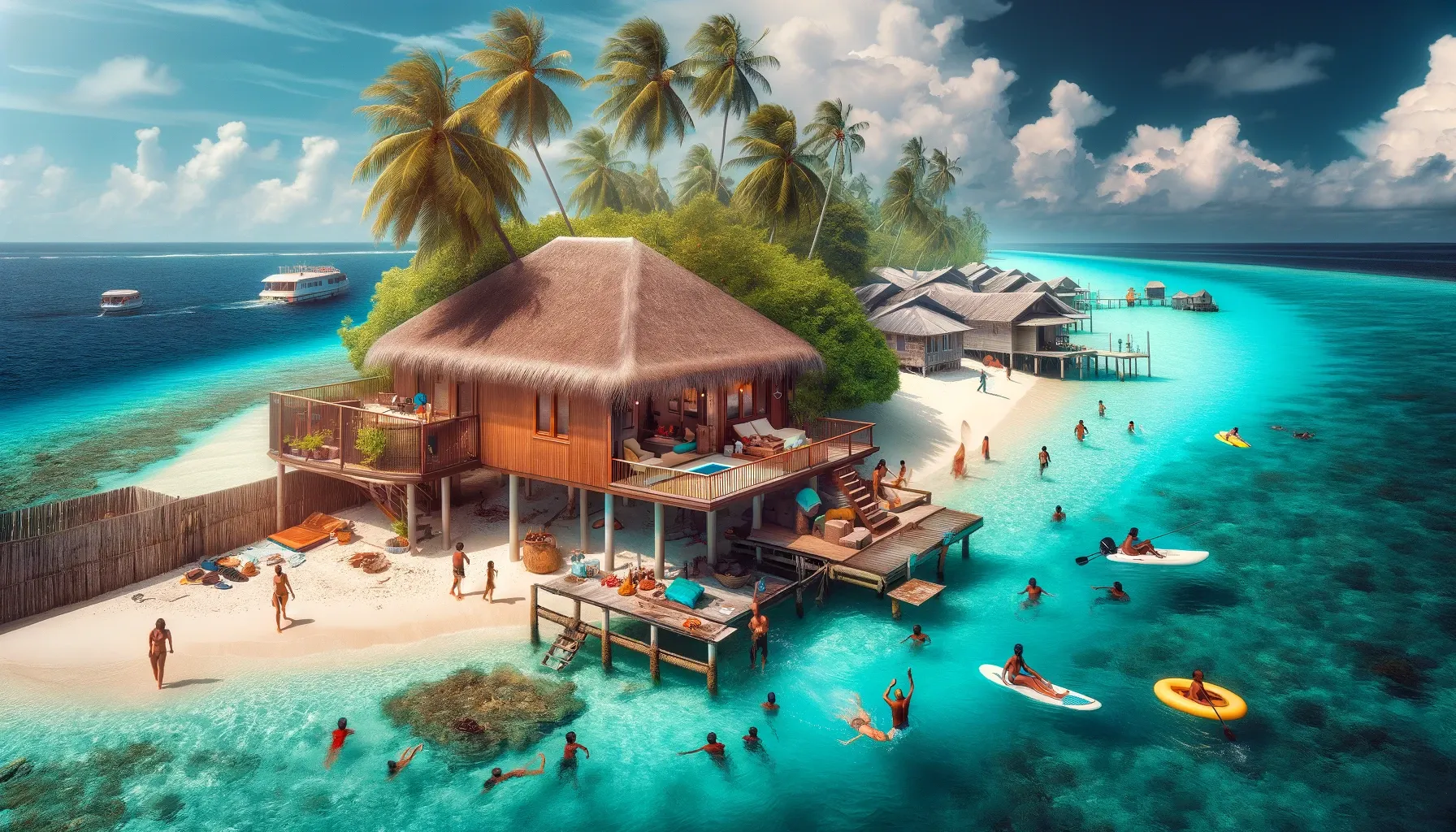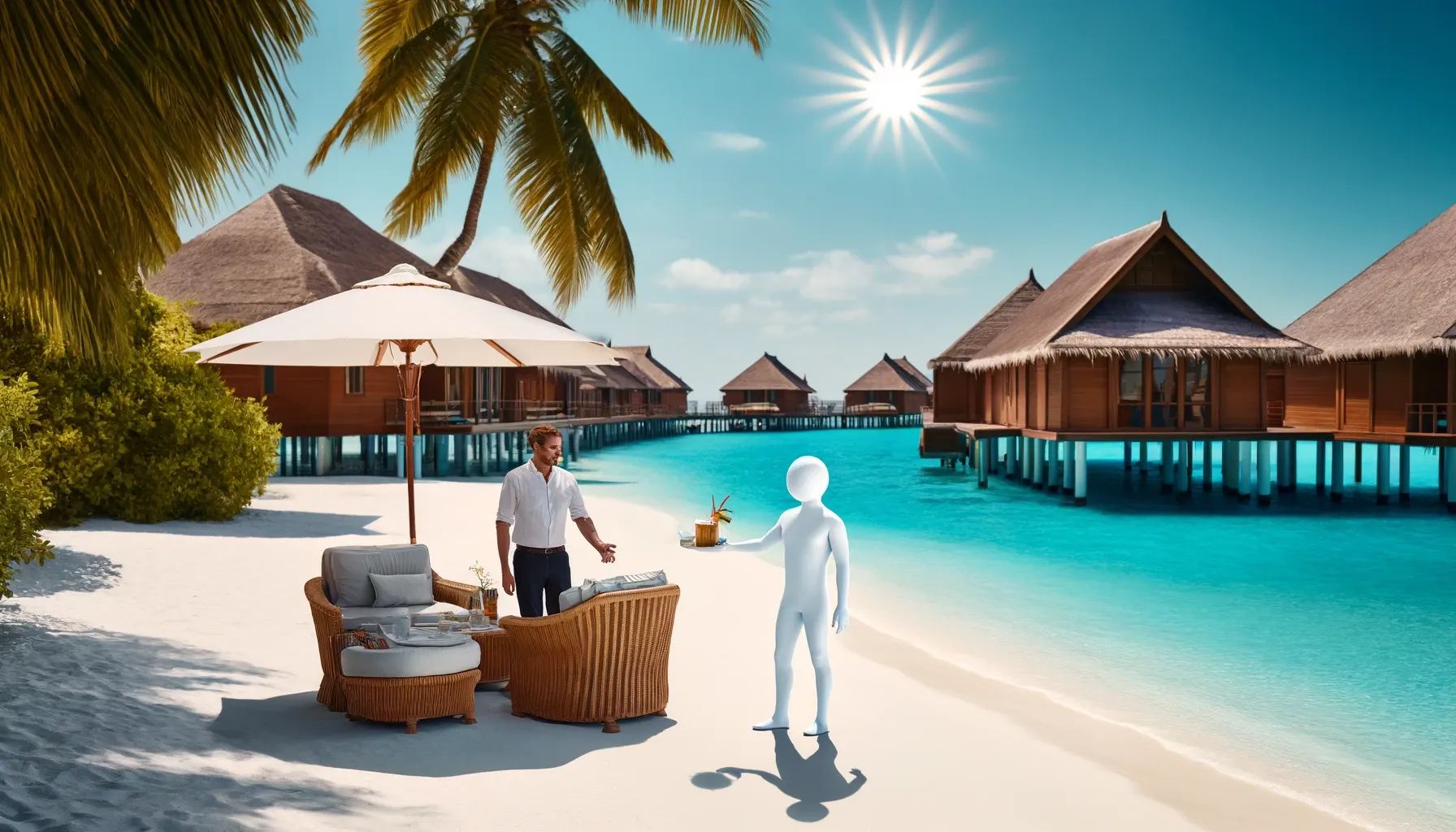The decision to emigrate: to explore new horizons or to stay put?

- Work in the Maldives: healthcare and hospitality industry
- Traveling to the Maldives: a unique experience of emigration and adventure
- The Maldives - a paradise for gourmets
- Life and work in the Maldives: seafood, fruits, fishing
- Islam and Traditions: The Mentality of the Maldives Archipelago
On an Unforgettable Journey to the Maldives
My trip to the Maldives was unforgettable and full of adventures! Upon arriving at the airport, I easily obtained a 30-day tourist visa by presenting my hotel booking confirmation and return ticket. To extend the visa for three months, I had to visit the Visa extension center in the capital and pay between $50 and $70, as well as arrange for annual insurance for $35. To obtain residency, you need to have a million dollars in a local bank account.
My friend Robin helped me with an invitation from a local "sponsor" for a small fee. White people in the Maldives are valued and welcomed, as they bring income and support the local economy.
Job vacancies in the Maldives
Foreigners have access to only two main areas of work on the islands: medicine and the hospitality industry.
Medicine
Doctors can earn between $2,000 and $5,000 a month, depending on their experience and qualifications. To work in this field, knowledge of English and relevant education from the Ministry of Health's list is required.
Hotel business
In the hotel business, salaries are modest, around $1,000 to $1,500, but there is an opportunity to earn additional tips. Resort workers, such as porters, animators, and diving instructors, may be available to foreigners. However, such contracts require full residency on the island. Most of the best positions in this field are held by locals, which is understandable given their good knowledge of the local culture and language.

The history of Russian emigration: my unique journey in the Maldives
Forget about all the intimidating myths that might scare you. In my experience in the Maldives, I've experienced encountered some challenges, but also found many positives of island life. To begin with, accommodations in the capital city of Male cost $40 a night in a hotel that was modestly in terms of comfort. But on our island of Magadoo we were able to rent a whole house for $200 a month, which had all the amenities, from the kitchen to the bathtub.
Buying land in the Maldives today is only possible under a 99-year lease, even for the wealthiest. The capital has over 130,000 residents living on 7 square kilometers, making land there a scarce resource.
Transport and getting around in the Maldives
To get to our island, we could take a seaplane or a speedboat. A 30-minute flight on Maldivian Airlines from Male cost me $80, while my husband with a work visa paid $300. We once took the plane when I had to return home in my eighth month of pregnancy. The second option is a trip on a 20-seat speedboat, which takes between two to six hours.
The boat trip had its challenges, but it was preferable to the open sea. The transportation situation in the Maldives is unique and has its own peculiarities. So, my trip to the Maldives was unforgettable and full of adventures. I have no regrets about the decisions I made and I am confident that it was the right choice. Only new discoveries and joyful moments lie ahead!!
Polina lives in a quiet village in the beautiful Maldives, where almost no one speaks English. The official language here is Dhivehi, which is a unique language that combines elements of Arabic and Hindi.
Although it was unusual for Polina, she found common ground with the help of a translator and local teenagers who, thanks to English-language content, perceive the English language more naturally.
Local cuisine
Island names like Magadu, Manadu, and Kendikuludu have become a part of her everyday reality, and the local cuisine has introduced her to a world of new flavors and aromas.
Local residents proudly highlight their diverse fish, especially tuna, which can be bought for just one and a half dollars per kilogram.
Polina remembers how the locals treated her to these delicacies as a sign of gratitude for her work.
"'Masuni' is a local breakfast made from canned tuna with coconut flakes. Although it may seem unusual to the unaccustomed eye, Polina discovered her love for this unique recipe."
Seafood delicacies
The Maldives are famous not only for their beaches and crystal-clear waters but also for the abundance of seafood delicacies.
- Octopuses that live near the shore are a popular attraction for snorkeling.
- Lobsters and tender rays are other seafood delicacies that can be enjoyed in the Maldives;
- In season, you can enjoy fresh fruits like mangoes, bananas, and water apples.
Polina remembers how she tried to recreate local dishes in her native Belarus, but faced difficulties in obtaining the necessary ingredients, including coconut flakes.
The Maldives is a place for foodies.
The Maldives offer not only relaxation and leisure but also amazing culinary discoveries that leave a lasting impression on those who visit this paradise.
Polina, like many others, has immersed herself in the atmosphere of island life, discovered new flavors, and is enjoying every moment of her stay in this magical place.
Seafood in the Maldives
Seafood in the Maldives is a true treasure. The locals prefer to barbecue fresh seafood due to the necessity of importing other products, which don't always meet quality standards. They bring chicken meat, milk, vegetables, and even eggs from various countries like India, Sri Lanka, China, and the Emirates, as there are no local alternatives on the islands. There is no decent milk at all, and you have to go far to find vegetables.
Fruits and vegetables in the Maldives
Fresh fruits in the Maldives are grown on special farm islands. For example, on one of the islands that serve luxury resorts like Soneva Jani, Cheval Blanc, and Sun Siyam Iru Fushi, fruits and vegetables are grown in special bags filled with soil that is brought to the island. It may not look appetizing, but this system provides the islands with the necessary produce.
Life in the Maldives
Life in the Maldives has its own peculiarities. The locals sometimes seem to be busy more out of boredom than real necessity. On an island where there are no poor people because everyone has their own job, there is a complete ban on alcohol throughout the country, which positively affects the health and productivity of the residents.
Work in the Maldives
About work. For example, on a small island with a population of about one and a half thousand people, a whole team of 12 people works in a small hospital.
9 October 2024
29 September
29 January
9 October 2024
Fishing in the Maldives
For those who don't like a standard schedule, there is an opportunity to become a fisherman. Fishing in the Maldives is a common job that brings in a decent income. Young people often take vacations to go out to sea for a catch. Teenagers can also earn money by catching sea creatures for restaurants. Sometimes they don't even need to try hard to find the right fish - it's enough to just go snorkeling.
Entertainment in the Maldives
The residents of the Maldives organize their work independently, often combining it with various forms of entertainment. For example, in addition to their main jobs, women may engage in sewing, nut gathering, or cooking for their families. Some even have two jobs to ensure a decent living.
There are many activities in the Maldives. The most popular of them is fishing. Despite the limited space on the small islands, locals use motorcycles, bicycles, or motorboats to reach other islands and the mainland. Fishing is both a job and a great pastime, as there are plenty of fish in the Maldives, and catching them becomes a true art.
The mentality of Islam in the Maldives archipelago.
This is a unique blend of traditions and everyday life that sets them apart from other countries in the world. Education in the Maldives has its own peculiarities: a narrow range of subjects that includes the basics of economics, accounting, and the study of the Quran from childhood. Interestingly, history is not a priority area of knowledge for the locals, and other books, except for textbooks, are simply not sold. Islam in the Maldives also has its own characteristics, where the Muslim dress code is strictly observed by women on the islands, while in the capital, many girls do not even cover their heads. Marriages in the Maldives are contracted at a young age; however, divorces are not prohibited and are not condemned by society.
About the beaches of the Maldives
Not all tourists are aware of the problem of beach pollution. On the islands, except for tourist resorts, you can find trash despite the apparent cleanliness. This garbage is brought in by the waves from other islands, which diminishes the beauty and cleanliness of the beaches. The heat in the Maldives can be unbearable, especially during the dry season. While searching for shade in the jungles, you may encounter mosquitoes, which adds to the discomfort.
Rules of conduct and clothing restrictions in the Maldives
It is important to remember that there are strict rules of conduct on the islands of the Maldives archipelago, related to clothing restrictions. Sharia prohibits wearing revealing clothing, including beachwear. On tourist islands, swimsuits and shorts are allowed, while local residents are subject to strict rules of Muslim dress.
My personal trip to the Maldives left an indelible impression. Despite some challenges, my stay on the islands was captivating and special. The search for the perfect place to live can be a long and complicated process, but it's important to find a balance between comfort and the beauty of nature. In my quest for my little piece of paradise and adventure, I continue my journey, and the Maldives remain one of the most amazing places worth visiting.
Having lived for a year in the Maldives, I realized that life on luxurious islands doesn't always match the idea of a perfect paradise. Work, culture, living conditions - all of these have their own peculiarities and challenges. The search for my own corner of life continues, and exotic places don't always meet all expectations. It's important to remember that the ideal place to live is not just about visual beauty, but also about comfort, opportunities, and balance. Each experience of emigration brings new lessons and helps to better understand oneself and one's preferences. The decision to emigrate is always a challenge and an adventure that shapes our vision of life and the direction of our development. I look forward to new discoveries and adventures on the path to my own happiness and balance.
Comment
Popular Posts
9 October 2024
1485
29 September
377
9 October 2024
9940
Popular Offers

Subscribe to the newsletter from Hatamatata.com!
Subscribe to the newsletter from Hatamatata.com!
I agree to the processing of personal data and confidentiality rules of Hatamatata



